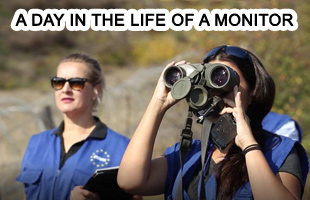Tbilisi, 15 June 2021—The Director for Security and Defence Policy at the European External Action Service in Brussels (EEAS), Joanneke Balfoort, paid a visit today to the European Union Monitoring Mission in Georgia (EUMM) on the occasion of the 100th Incident Prevention and Response Mechanism (IPRM) meeting, which the Mission co-facilitated.
EUMM Head of Mission, Ambassador Marek Szczygieł, welcomed Director Balfoort at the Mission’s Headquarters in Tbilisi for an update on the latest security and humanitarian developments on the ground.
Following the briefing, they travelled to Ergneti, right at the Administrative Boundary Line with South Ossetia, where Director Balfoort delivered introductory remarks at the opening of the 100th IPRM meeting, alongside with the Secretary General of the OSCE, Helga Maria Schmid.
During her remarks, Director Balfoort reiterated EU’s strong commitment to peace and stability worldwide and in the region, including with the presence of EUMM since 2008.
“Thanks to our Mission on the ground - EUMM, the EU contributes to peace and stability and promotes confidence-building. Concrete tools such as the IPRM meetings and the EUMM-managed Hotline are critical to help build confidence and maintain stability, in the interest of the local population,” stressed Director Balfoort.
“IPRM meetings give a platform for participants to raise concrete incidents such as detentions, discuss local issues such as access to water, and, overall, de-escalate tensions and build confidence. They focus on the needs of, and seek to find practical solutions for the conflict-affected population,” highlighted EUMM Head of Mission, further underlining the need for such a dialogue to be encouraged.
In the afternoon, Director Balfoort continued her field visit to the South Ossetian Administrative Boundary Line with EUMM Deputy Head of Mission, Kate Fearon, with whom she went to Odzisi, including to the controlled crossing point.
There, she witnessed first-hand ‘borderisation’ features—such as wire fences and observation posts— and learnt more on how such ‘borderisation’ and the protracted closure of controlled crossing points negatively affect the local population in terms of their access to, inter alia, education, healthcare, and lands.
BACKGROUND
The EU Monitoring Mission in Georgia (EUMM) was deployed in 2008, following the August-conflict between Georgia and the Russian Federation. Ever since, the Mission’s monitors have been patrolling—day and night, 365 days a year—the areas adjacent to the Administrative Boundary Lines with the breakaway regions of South Ossetia and Abkhazia. The Mission observes and analyses security developments along the lines, as well as their impact on the conflict-affected population; its findings inform EU policy.
In addition, the Mission works to build confidence among the conflict-parties through several tools, including the Incident Prevention and Response Mechanism (IPRM) meetings in Ergneti, which take place right at the Administrative Boundary Line with South Ossetia.
The Incident Prevention and Response Mechanism (IPRM) meetings in Ergneti are facilitated jointly by EUMM Head of Mission and the Special Representative of the OSCE Chairperson-in-Office for the South Caucasus, with the participation of Georgian, Russian, and de facto South Ossetian authorities. They offer participants an opportunity to meet in person to exchange information and discuss concrete security and practical humanitarian issues. If discussions can at times be challenging, the meetings have proven very useful in building greater confidence and cooperation between participants. For more: www.eumm.eu
The Security and Defence Policy Directorate (SECDEFPOL) is responsible for coordinating and managing the EEAS overall contribution to addressing external security threats and supporting efforts to implement the EU Global Strategy in the area of security and defence, in particular as regards the development of policies and tools to fulfil the EU level of ambition and the further development of the EU’s Common Security and Defence Policy.


